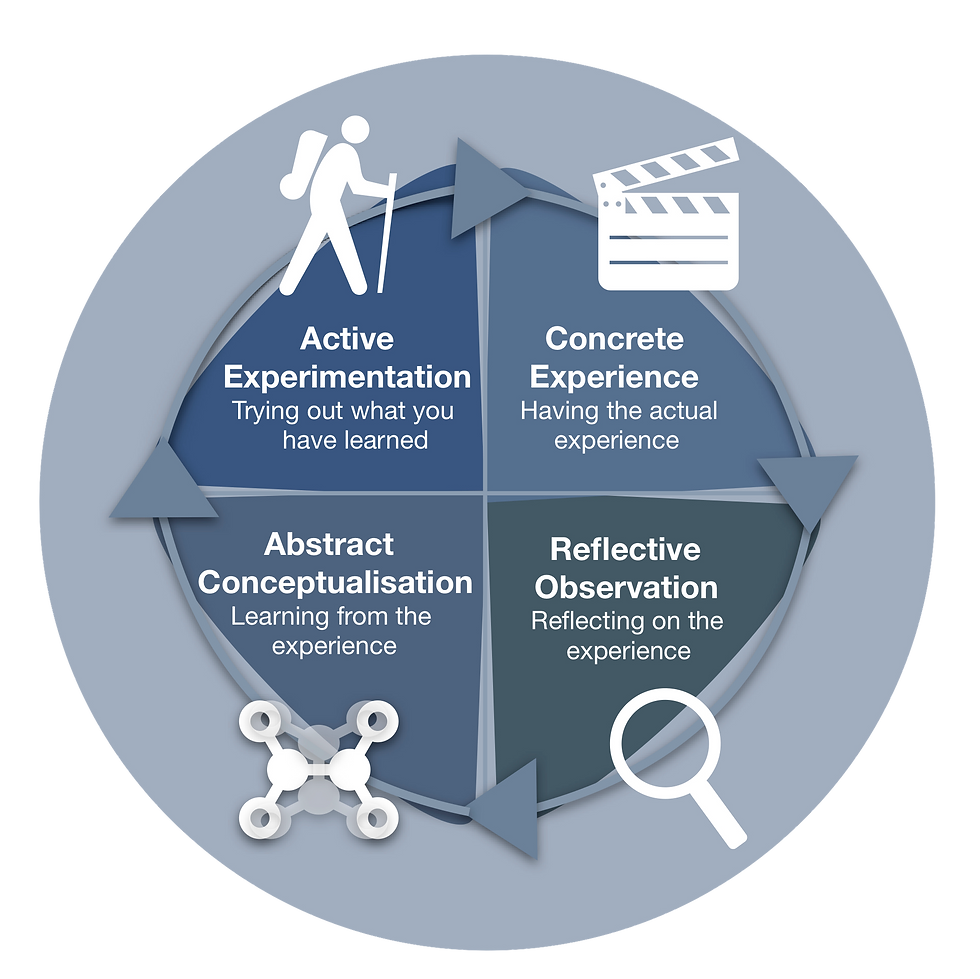The Science of learning: best ways to make training stick
- Rebekah Liersch

- Aug 5, 2022
- 4 min read
Updated: Oct 14, 2022
How can learning experience designers ensure that training has the highest return-on-investment and the greatest impact? Understanding andragogy (adult learning) and the science of learning is the foundational first step.
Below are my top 4 tips for designing impactful learning experiences using the science of learning.
1. Ensure learners take responsibility - it improves their performance

Taking responsibility or ownership is an intrinsic motivation to learn. Naturally, when a problem is valued as relevant, the adult learner will take responsibility. Recognising that adults need to take responsibility for their learning is a defining hallmark of adult learning theory. To trigger a sense of ownership, adult learning theory (also known as Andragogy - a theory revolutionised by Malcolm Knowles) emphasises that learning experiences and material must demonstrate it will help adult learners meet the requirements of their lives.
Taking responsibility requires context

Adult learners have a need to know why what they’re learning is relevant. Knowles’ theory of andragogy stresses the importance of this innate need in the adult learning process. Learning must provide context to demonstrate that it will help the adult learner meet the requirements of her/his professional expectations. This is true within the workplace but also true in the pursuit of learning to achieve personal and recreational goals.
Taking responsibility requires problem-centred learning
Adults are problem solvers. Content should be primarily problem-centred, not subject-centred. Naturally, if the problem is valued as relevant, the adult learner will take responsibility and subsequently be intrinsically motivated to solve the problem with the help of your training content.
2. Design experiential, problem-centred learning

Adult learning theory (Andragogy) describes adults as experiential learners. Experiential learning is the process of constructing one’s own knowledge based on prior experiences and knowledge - this process embodies the theory of constructivism. Learning theorists Vygotski and Piaget (respected contributors to constructivism) observed that adult learners are capable of abstract thinking. This means they observed that as adults learn, they regularly reflect on their current or past experiences and make projections about future experiences.
A helpful cycle to capture the experiential learning process is the Cycle of Experiential Learning created by another educational theorist, David Kolb. Effective adult learning is seen when a person enters at any stage of the cycle and progresses through its logical sequence. Learning experience designers benefit from utilising this when preparing to engage an adult learner. Designing training that ensures the adult learner will progress through the cycle sequence can markedly increase its effectiveness.
Kolb's Cycle of Experiential Learning

3. Enable choice - adults thrive on self-direction

“Adults have a deep psychological need to be self-directing; in fact, the psychological definition of ‘adult’ is one who has developed a self-concept of being responsible for one’s own life.” - M. Knowles

At its best, an adult learning experience should be a process of self - directed inquiry, with the resources of the guide, fellow learners, and materials being available to the learner but not imposed on her/him. This means adult learners are more likely to take ownership of their learning when offered a learning selection. This could look like access to training content and resource options on an LMS or intranet, allowing learners to develop their own learning path in addition to completing required compliance training. Steps like these can cultivate the ideal learning culture for upskilling and performance improvement.
4. Accommodate diversity
Adults present with a wide range of individual and situational differences. Instructors and learning experience designers must be aware of the situational differences within their learner demographic.
Accommodating individual differences
Adults have differing learning preferences thus making multimodal, scenario-based, gamified and blended learning the most accommodating methods of instruction. The outdated “one-style-fits-all” use of solely PPTs, PDFs, lecture notes, etc is an approach that wastes money and resources as it is largely infective. Today recognition of multiple learning preferences is best practice. One example is Neil Fleming’s popular VARK model. While survey data can provide awareness of the learner preference bias within a learner demographic, best practice involves the incorporation of all learning styles in delivery.
VARK Model

Accommodating situational differences

It is undeniable that situational differences affect how adults learn. This means that flexibility is essential. Flexible learning is ideally offered as learning experience content that can be easy to access, navigate, pause and resume on:
• a learning management system (LMS),
• company intranet or
• an employee relationship management system (ERM).
Even better, micro learning provides learning in small chunks over time improving retention. In some cases, a needs analysis may deem an instructor-led workshop the best learning solution to meet a learning target and benefit employees and their situational differences.
Endnotes
Henschke, J. A. (2016) "A History of Andragogy and its Documents as they Pertain to Adult Basic and Literacy Education" PAACE Journal of Lifelong Learning, Vol. 25, 1-28, <https://www.iup.edu/pse/files/programs/graduate_programs_r/instructional_design_and_technology_ma/paace_journal_of_lifelong_learning/volume_25,_2016/henschke-1.pdf>
David C. M. Taylor & Hossam Hamdy (2013) "Adult learning theories: Implications for learning and teaching in medical education: AMEE Guide No. 83," Medical Teacher, 35:11, e1561-e1572, <https://doi.org/10.3109/0142159X.2013.828153>
Quratulain, Iffat Basit, Khuda Bakhsh, Muhammad Hafeez (2021) "Adult Learning Theories and their Role in Instructional Design, Curriculum Development and Educational Technology," WSEAS Transactions on Environment and Development, vol. 17, pp. 1149-1159, 2021, DOI: 10.37394/232015.2021.17.106, <https://wseas.com/journals/articles.php?id=698>
Svein Loeng, (2020) "Self-Directed Learning: A Core Concept in Adult Education", Education Research International, vol. 2020, Article ID 3816132, 12 pages. <https://doi.org/10.1155/2020/3816132>
Further reading



Comments